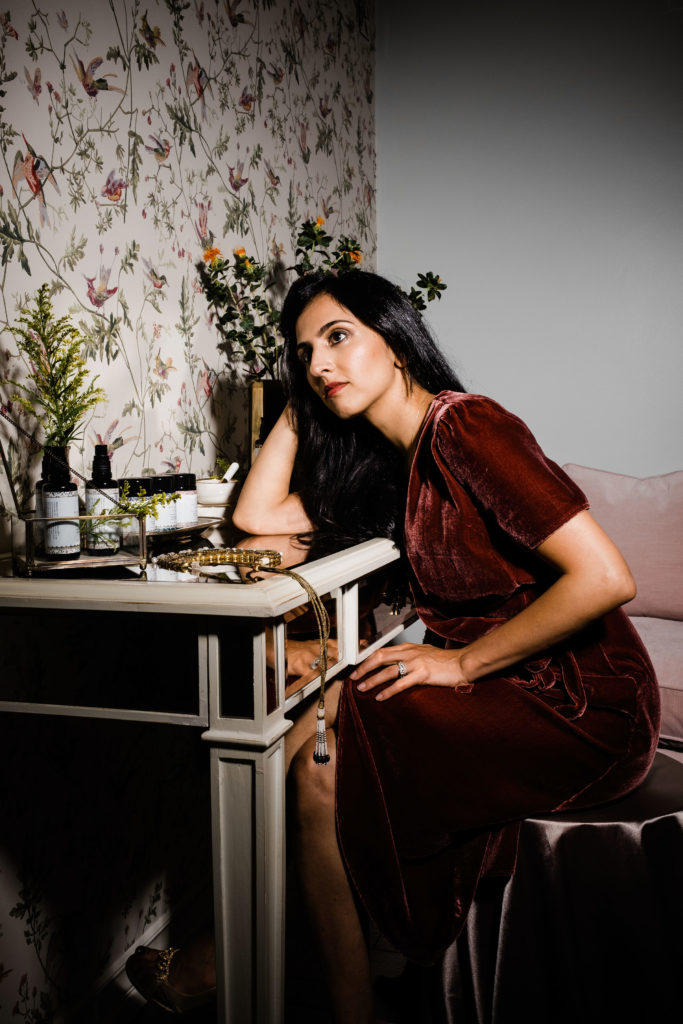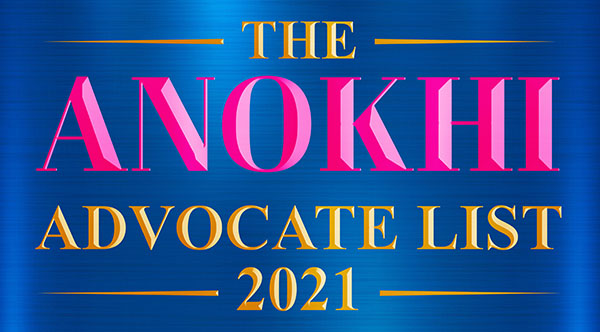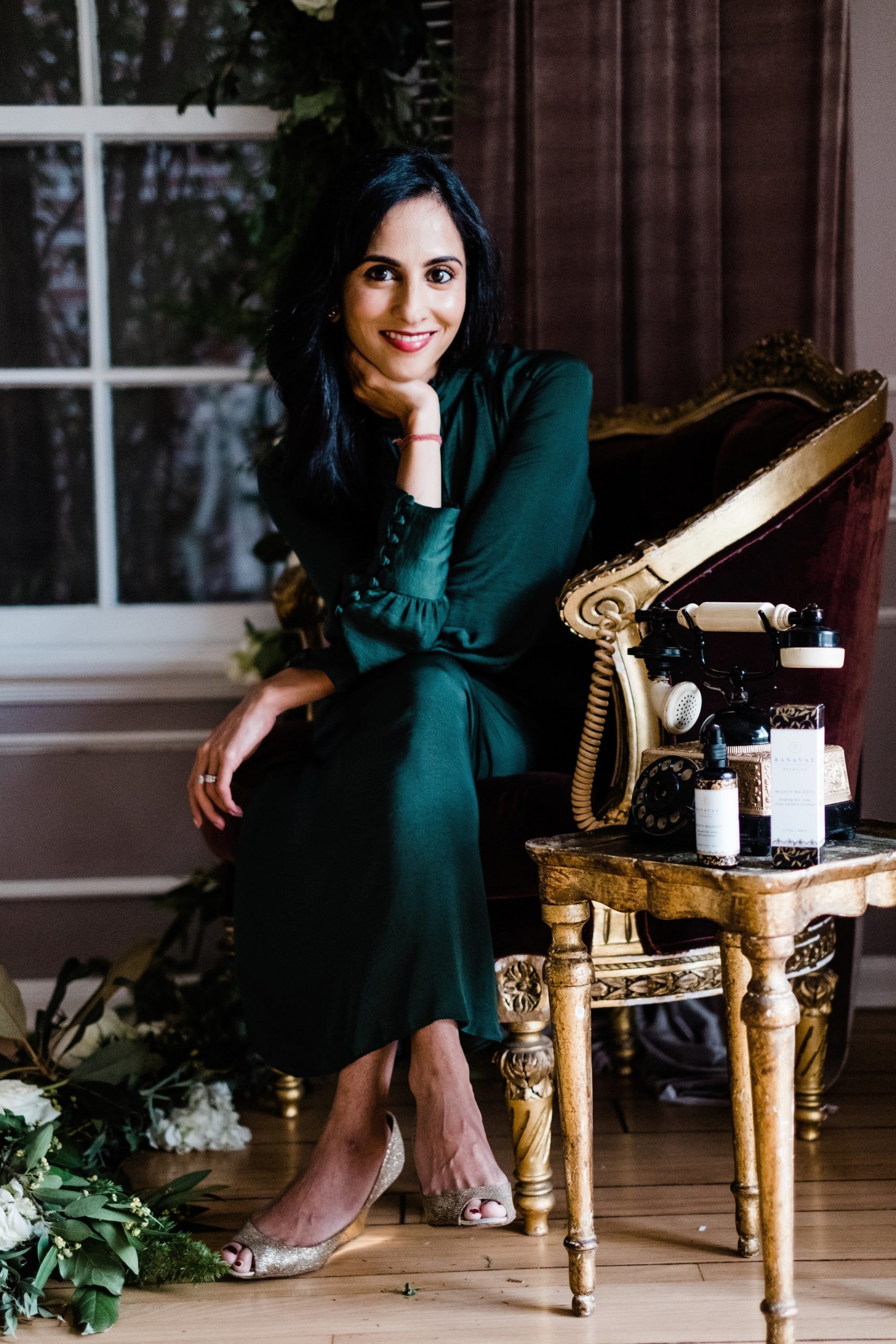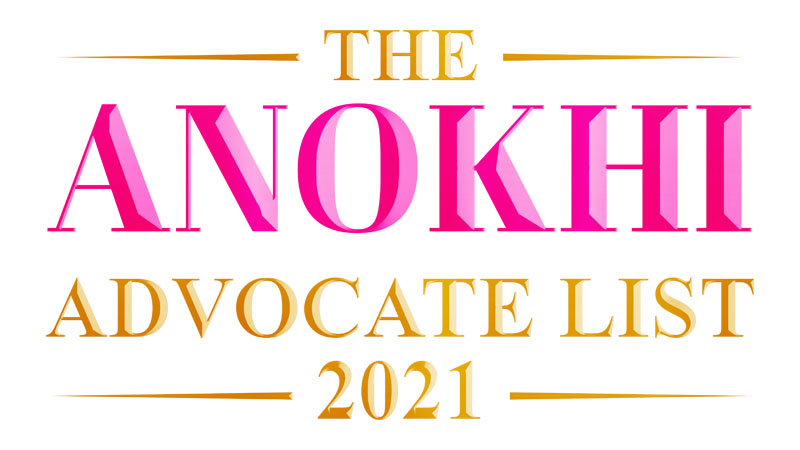RANAVAT is an internationally renowned beauty company based out of California, which supports the entire ecosystem from the preservation of ancient traditions to the skilled artisans that work from generation to generation to hone their craft. While wellness and Ayurveda-inspired ingredients are trending, there is an opportunity to be the first to share the art of Ayurveda from a South-Asian founded brand.
With a background in science, 4 years of work at a prestigious finance firm on Wall Street and after 6 years of pharmaceutical sourcing, Michelle Ranavat fused her expertise with a love and appreciation for artisanal Indian tradition.
Raj Girn: I’m thrilled to be chatting with Michelle Ranavat, the founder of the RANAVAT beauty brand and its incredible contribution to advocacy in the beauty space, for which Michelle is being honored on The ANOKHI Advocate List commemorating the 19th anniversary of ANOKHI LIFE’s service to the global South Asian community. Welcome to the show, Michelle, and a huge congratulations for making this honor.
Michelle Ranavat: Oh, thank you so much. It’s such a pleasure and honour to be here.
RG: Well, I can’t wait to kind of dive right in, but before we do, let’s just give people a little bit of information about your company. So guys, RANAVAT is an internationally renowned beauty company based out of California, which supports the preservation of ancient traditions and beauty, along with skilled artisans that work from generation to generation. While Ayervedic ingredients are trending, Michele forged forward to create RANAVAT marrying her background in science and six years in pharmaceutical sourcing with a deep appreciation for artisanal Indian traditional resources. It is her advocacy for holistic eye of Ayurvedic ingredients-based beauty products that has resulted in her being honoured this year. So Michelle, let’s begin by asking you what advocacy means to you.
MR: Advocacy to me is really championing. In short, really taking someone that may not be able to step into their power for whatever reason. In our case, it’s artisans that are getting pushed aside for machinery faster turnaround. We are just losing some of that artistry and deep knowledge that we’ve had for generations. And so to me, advocay, it’s about bringing awareness, championing and really just empowering those people.
RG: Absolutely. So why is advocacy important?
MR: Advocacy is important because you always want— especially when you think about beauty brands — I mean, there’s a million and one cleansers and serums and things out there. But I think advocacy is important because you want to create something with meaning. Every day you wake up [and] you work so hard. And if you’re not creating something that has true meaning, you’re not advocating for someone and you’re not really empowering them. I feel that you’re missing this huge opportunity. And so for me this is not so much about having a business. And of course, I love those things, and I love sort of challenging myself in many ways. But the story isn’t actually about me, this company and this brand and this mission is so much more. I revealed that the history, the science and really earning our place in mainstream beauty, seeing all of these incredible treatments from different areas like Europe and Asia, Korea, things like that, I would love to see India and South Asia really have its moment in mainstream, and it really has been. I just don’t think there’s that awareness in that education. I think that’s where our advocacy comes in.
RG: Michelle, I want to ask you this can you share with me and our community here why it’s so important for people to incorporate a sense of advocacy into their lives, be it personal, professional, spiritual or all of the above? I like a feel that you’ve answered the question, let’s encapsulate it for everyone.
MR: I think it’s a simple word, which is intention, and I carry that throughout my entire day. So whether I’m doing my skincare routine, I want to do my routine with the best of intentions, right? You can just kind of take a serum and throw it all over your face and just move on with your day. Or you can take a moment to really connect with that product or that meaning, for example, saffron is very calming. Monks wear saffron coloured robes because it really links to purity and can you step into a temple. Saffron is involved, so it’s really much more than that. And so if you can actually be intentional with the way that you do your routine, maybe it’s taking a few moments to massage it into your skin. Maybe it’s taking a couple of deep breaths. Maybe it’s connecting with the root or the origin of that product. I think you have a completely different experience. And so that’s really where our advocacy comes into the mix. It’s about really building that level of intention. It’s not doing something to do it. But if you are advocating for something or someone, whether it be honestly yourself and your self-care routine and treating yourself the way that you deserve to be treated or you’re thinking about the people and the teams and the generations behind something like the saffron serum, it doesn’t really matter where that comes from. It just matters that you’re doing things with intention and that. Advocating is truly important, because then you’re taking control of the situation and you’re bringing yourself into that power.

RG: Let’s talk about how important advocacy has been in the last year, Michelle, and based on everything that you’ve said so far, it’s based on even the last couple of years of, you know, some of the things that we’ve had to deal with on a global scale. What have you seen that has stood out in our world that is really changing to meet people where they’re at rather than the conditioning and the fitting into historical preconceived ideologies. What have you personally seen that you think is something that we need to note?
MR: I think that embracing our own uniqueness and creating that into our superpower is something that I found to be really empowering. And I think that is a part of advocating for yourself is to instead of taking things that make you different and having them bring you down, actually using them as something that you are proud of. You know, for me and I think many people can relate to growing up as a first generation South Asian American, there were so many things that I was called different for, and some of them included things like hair oiling, which now to this very day are things that have built my business and become a huge part of sharing RANAVAT with the world. And so I think it’s not to say that, you know, everything is going to result in a business idea, but I think there’s some truth to really taking those differences, those unique areas and advocating for yourself, championing them and really being proud of that. And I think that even links to even in India. For a while, there was just like, ‘oh, well, it’s all about imported products or Western products that work more’. And we started to ignore and we started to think that because it was so old or ancient that it wasn’t really relevant. But look, I mean, today, if anything, this past year has taught us meditation, mindfulness, all of these things that are actually very old practices are more than relevant. So there’s really no such thing as just because it’s older dated means that it doesn’t have a place in our modern world. So I think all of that together really sort of encapsulates the way that I feel about advocacy and really just like empowering ourselves.
RG: You know, it kind of begs a question. Along with advocacy comes slacktivism. So this is kind of the notion that creating or tweeting a hashtag a person is giving, you know, to this idea or notion that they’re contributing to the cause being hashtag. What’s your philosophy around paying quote-unquote lip service like this rather than actioning the cause? Like what, in your opinion, are the pros and cons?
MR: You know, I think any level of being excited about the cause or any level of support is, to me, positive. I think you’re just maybe if you’re not the one that you’re just retweeting and you’re not doing anything about it. But maybe that goes to someone that does do something. I just think that there’s no contribution too little. And I think of that on social media all the time. There’s some people that will like a video or some people or view it or not like it. And there are some people that will comment and that will share it. There’s all different levels of interacting with your content. Same with activism. So many different levels, you know, even if you’re just sitting at home and you’re thinking positively about something that you want to do or a cause or you’re just even empathizing with that person, I think that’s great. You’re putting something out into the world that’s helpful. And I think there’s no contribution too small.
Advocating is truly important, because then you’re taking control of the situation and you’re bringing yourself into that power.
RG: I love that. I’d love to ask you, can you share a challenge that stands out for you, something that you’ve had to overcome when it comes to voicing your support for a cause you believe in might share that with our community.
MR: I would say that there’s so many different levels of challenges, and I think if in some ways I can think of myself as someone that I have had to overcome in many ways. Like starting RANAVAT. I wasn’t an influencer. I mean, I still don’t really consider myself any type of influencer. I never really had a beauty background in any way. I really come from the sciences. And so I think I always sort of had so many reasons to think that, ‘oh, well, maybe this isn’t for me’, but I think the challenge was to overcome that and to realize that we have the ability to learn and grow. And if we are doing something that we truly care about, we will garner those skills and figure it out. And so I think that was a huge challenge for me. And I think if you want to link it to even South-Asian skincare, I mean, I definitely felt and heard so much feedback when I started the company in in 2017. And so back then I know it’s not so long ago, but believe it or not, the word [Ayurveda] I used to say it to buyers and they were just like, too complicated, you know, people don’t really care about it. We don’t really we’re not sure if it’s a trend or not. And then, you know, fast forward to 2020, when many people turn to self-care and turned to these ancient traditions. And also even championing culture that was a part of the 2020 movement, an awakening that had happened. I think all of those things combined really started to open the eyes of people in the beauty industry to realize, like, ‘wait a minute, maybe you’re right, that does deserve a spot here’. And I had to advocate for myself so much and for our community to really say that, look, Korean beauty isn’t for Koreans, it’s for everyone individually in our traditions, for not just for South Asian. They’re actually super helpful for everyone and we should be sharing this. The ingredients are incredible. They work well for the skin. This is something that should not just stay within ourselves. And so it took a lot of work to get through.
RG: And was it worth it for you?
MR: Oh, I mean, that’s like what I do, right? That inspires me and drives me every day. So of course, yeah, I mean that to me. The outcome is something that I’m excited about and motivated by. I’m just passionate about sharing the education around it and bringing the awareness of all the other things, like opening into new retail and selling more product. That’s more of like a side thing for me. Like, great, it’s a great result of that. But what I care the most about is really the education part of it.
RG: With all that you’ve seen and experienced, Michelle, what advice would you give to everyone watching, listening and reading this who want to be more proactive in a cause that they believe in to actually get up and action it?
MR: I think community is really important in that, so whether it’s surrounding yourself with people that are doing this already or you want to start with something familiar, so maybe you don’t want to start actioning with people you don’t know, maybe you just start. For me, if I use myself as an example, I started to get so excited about that I was telling my family about it. I was telling my friends, and that’s a really comforting place to start, and you get their feedback and you feel more empowered. And then maybe you start talking to people that you wouldn’t share the stuff with and then you kind of move to the next phase. So I would say, really the key is starting with the familiar creative community. And I don’t mean create and like new people, you can just use the people that you already know, those friends and family members. Test it out with them. Who do you think will want to action this cause with you and then start from there. I think it’s so much easier to take any sort of new endeavour or, I guess, journey that you want to start and just go with what’s familiar. And then you can start to expand and grow and build that.
RG: Michelle wise words so many insights. I want to sincerely thank you so much for coming on the show and sharing your insights with our global community, especially around kind of the marriage and intersection between modern and traditional beauty and and how that can translate over into the well being journey, that we all are on, especially now with the last couple of years being what they’ve been. And congratulations again, and I wish you much success, and I really hope you continue your journey into your active advocacy for wellness beauty. I’m super excited to see what else is going to happen for the RANAVAT brand and how it’s going to help all of us around the world. I really, really, truly wish you the best.
MR: Thank you, Raj. I really appreciate that so much.
Photos Courtesy Of Michelle Ranavat



